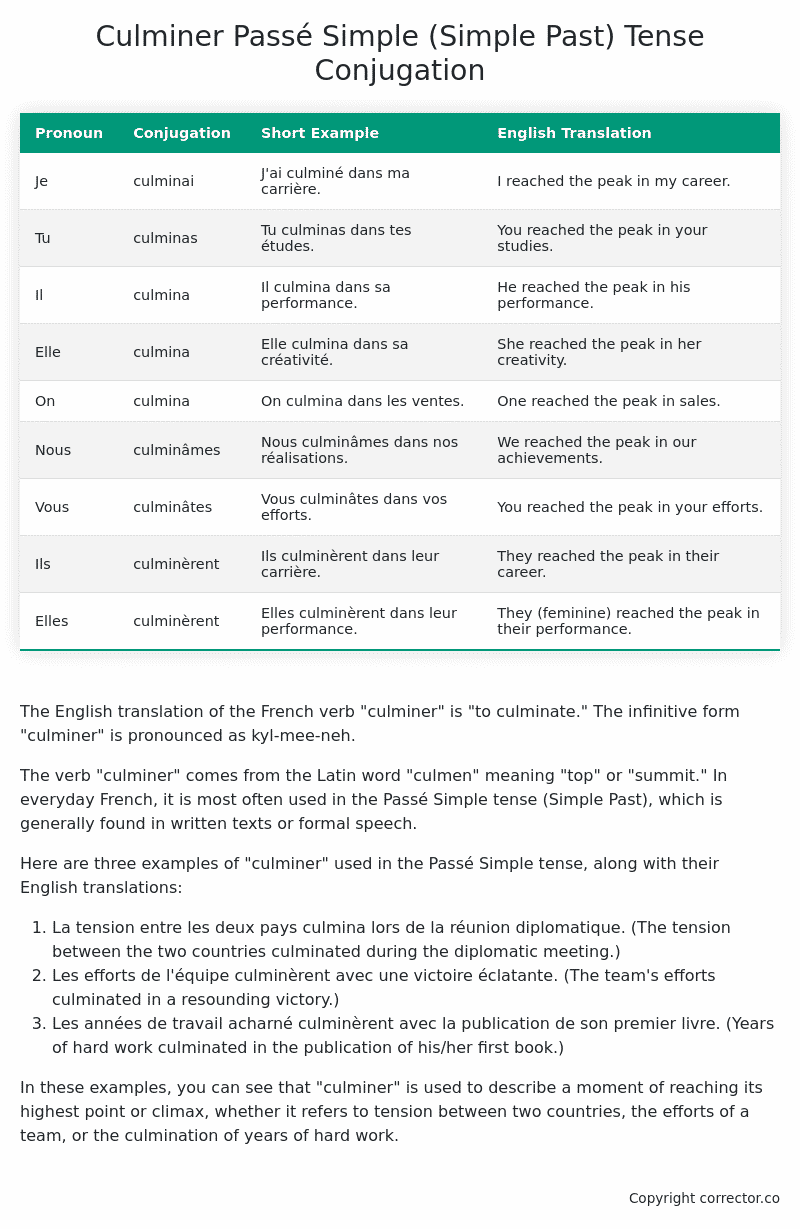Passé Simple (Simple Past) Tense Conjugation of the French Verb culminer
Introduction to the verb culminer
The English translation of the French verb “culminer” is “to culminate.” The infinitive form “culminer” is pronounced as kyl-mee-neh.
The verb “culminer” comes from the Latin word “culmen” meaning “top” or “summit.” In everyday French, it is most often used in the Passé Simple tense (Simple Past), which is generally found in written texts or formal speech.
Here are three examples of “culminer” used in the Passé Simple tense, along with their English translations:
- La tension entre les deux pays culmina lors de la réunion diplomatique. (The tension between the two countries culminated during the diplomatic meeting.)
- Les efforts de l’équipe culminèrent avec une victoire éclatante. (The team’s efforts culminated in a resounding victory.)
- Les années de travail acharné culminèrent avec la publication de son premier livre. (Years of hard work culminated in the publication of his/her first book.)
In these examples, you can see that “culminer” is used to describe a moment of reaching its highest point or climax, whether it refers to tension between two countries, the efforts of a team, or the culmination of years of hard work.
Table of the Passé Simple (Simple Past) Tense Conjugation of culminer
| Pronoun | Conjugation | Short Example | English Translation |
|---|---|---|---|
| Je | culminai | J’ai culminé dans ma carrière. | I reached the peak in my career. |
| Tu | culminas | Tu culminas dans tes études. | You reached the peak in your studies. |
| Il | culmina | Il culmina dans sa performance. | He reached the peak in his performance. |
| Elle | culmina | Elle culmina dans sa créativité. | She reached the peak in her creativity. |
| On | culmina | On culmina dans les ventes. | One reached the peak in sales. |
| Nous | culminâmes | Nous culminâmes dans nos réalisations. | We reached the peak in our achievements. |
| Vous | culminâtes | Vous culminâtes dans vos efforts. | You reached the peak in your efforts. |
| Ils | culminèrent | Ils culminèrent dans leur carrière. | They reached the peak in their career. |
| Elles | culminèrent | Elles culminèrent dans leur performance. | They (feminine) reached the peak in their performance. |
Other Conjugations for Culminer.
Le Present (Present Tense) Conjugation of the French Verb culminer
Imparfait (Imperfect) Tense Conjugation of the French Verb culminer
Passé Simple (Simple Past) Tense Conjugation of the French Verb culminer (You’re reading it right now!)
Passé Composé (Present Perfect) Tense Conjugation of the French Verb culminer
Futur Simple (Simple Future) Tense Conjugation of the French Verb culminer
Futur Proche (Near Future) Tense Conjugation of the French Verb culminer
Plus-que-parfait (Pluperfect) Tense Conjugation of the French Verb culminer
Passé Antérieur (Past Anterior) Tense Conjugation of the French Verb culminer
Futur Antérieur (Future Anterior) Tense Conjugation of the French Verb culminer
Subjonctif Présent (Subjunctive Present) Tense Conjugation of the French Verb culminer
Subjonctif Passé (Subjunctive Past) Tense Conjugation of the French Verb culminer
Subjonctif Imparfait (Subjunctive Imperfect) Tense Conjugation of the French Verb culminer
Subjonctif Plus-que-parfait (Subjunctive Pluperfect) Tense Conjugation of the French Verb culminer
Conditionnel Présent (Conditional Present) Tense Conjugation of the French Verb culminer
Conditionnel Passé (Conditional Past) Tense Conjugation of the French Verb culminer
Conditionnel Passé II (Conditional Past II) Tense Conjugation of the French Verb culminer
L’impératif Présent (Imperative Present) Tense Conjugation of the French Verb culminer
L’impératif Passé (Imperative Past) Tense Conjugation of the French Verb culminer
L’infinitif Présent (Infinitive Present) Tense Conjugation of the French Verb culminer
L’infinitif Passé (Infinitive Past) Tense Conjugation of the French Verb culminer
Le Participe Présent (Present Participle) Tense Conjugation of the French Verb culminer
Le Participe Passé (Past Participle) Tense Conjugation of the French Verb culminer
Struggling with French verbs or the language in general? Why not use our free French Grammar Checker – no registration required!
Get a FREE Download Study Sheet of this Conjugation 🔥
Simply right click the image below, click “save image” and get your free reference for the culminer Passé Simple tense conjugation!

Culminer – About the French Passé Simple (Simple Past) Tense
Formation
Usage
Narration
Historical Context
Interactions with other tenses
Passé Composé
Imparfait
Conditional and Subjunctive
Summary
I hope you enjoyed this article on the verb culminer. Still in a learning mood? Check out another TOTALLY random French verb conjugation!


